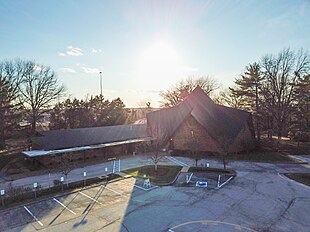For similarly named synagogues, see Emanu-El.
| Temple Emanuel | |
|---|---|
 Temple Emanuel in 2018 Temple Emanuel in 2018 | |
| Religion | |
| Affiliation | Reform Judaism |
| Ecclesiastical or organisational status | Synagogue |
| Leadership |
|
| Status | Active |
| Location | |
| Location | 12166 Conway Road, Creve Coeur, Missouri |
| Country | United States |
 | |
| Geographic coordinates | 38°38′29″N 90°26′51″W / 38.6414°N 90.4474°W / 38.6414; -90.4474 |
| Architecture | |
| Architect(s) | William Bernoudy |
| Type | Synagogue |
| Style | Modernist |
| Date established | 1956 (as a congregation) |
| Groundbreaking | 1961 |
| Completed | 1962 |
| Materials | Roof: Laminated wood beams, decking, copper |
| Website | |
| testl | |
Temple Emanuel is a Reform Jewish synagogue located at 12166 Conway Road, near the corner of New Ballas Road, in Creve Coeur, Missouri, in the United States. Organized in 1956, it is affiliated with the Union for Reform Judaism (UAHC). It has a membership of 300 families.
The Temple is notable not only for its size, but for its unique Modernist architecture.
History
A group of parents in the area first had the idea to form a synagogue in the 1940s as a way to further their children's religious education. They founded St. Louis School for Judaism in September 1953 and organized the synagogue in 1956, choosing the name "Temple Emanuel" on December 16, 1956. It was the first Reform congregation founded in St. Louis in 70 years. The congregation initially had 48 families, and services were held at the Bible Presbyterian Church. Construction at the Conway Road site began in September 1961, and the completed building was dedicated in January 1963. The synagogue is affiliated with the UAHC.
In March 2008, the synagogue and Temple Israel in Creve Coeur (which had approximately 1,000 families) announced a plan to merge, which would have created a congregation of 1,400 families, one of the area's largest Reform Jewish congregations. After two months of discussions among some leaders of the synagogues, the matter became public when the two Boards of Directors were asked for their input. The membership of Temple Emanuel were given presentations on possible merger in April. The school enrollment had declined from 137 students in 2001 to 79 students in 2008. Ultimately, after 2/3 of congregants indicated that they preferred independence in balloting the following month, the congregation decided overwhelmingly to remain independent.
In 2010, Temple Emanuel mounted an exhibition of black and white photographs of Albanian Muslims who rescued 2,000 Jews during the Holocaust. Its rabbi said a goal of the congregation with the exhibit was "to tell people ... these are examples of Muslim-Jewish respect, tolerance and love."
Services, classes, and programs
The synagogue provides Shabbat and Sunday religious services. Temple Emanuel instituted its Sunday services in 1958, decades after the Sunday-Sabbath movement in American Reform Judaism had largely ended.
It also provides Sunday religious school and Hebrew in preparation for Bar/Bat Mitzvah, as well as Torah study and adult learning courses. In addition, it provides programs on interfaith issues and family learning, as well as youth and senior programs.
Membership, clergy, and leadership
As of 2016, the synagogue had a membership of about 250 families.
Temple Emanuel's Senior Rabbi is Elizabeth Hersh. Its Rabbi Emeritus and Senior Scholar is Dr. Joseph R. Rosenbloom, who has been rabbi at the synagogue for more than 42 years. Since 1977, the temple's "Cantorial Soloist" has been Malachi Owens, a non-Jewish African American who worked as an electrical engineer and has also been a Baptist minister since 1998.
Design

Its 1962 building in the St. Louis suburb of Creve Coeur, Missouri, was designed by architect William Bernoudy, of the firm Bernoudy-Mutrux-Bauer, which was known for its originality. It was designed in the shape of the six-pointed Jewish star. The congregation owns the building, and the land on which it sits.
The St. Louis County Historic Buildings Commission has named the synagogue an outstanding example of mid-century Modern architecture worthy of preservation.
References
- "Lay leadership". Temple Israel.
- Betsy Sheldon (2001). The Jewish travel guide. Hunter Publishing, Inc. ISBN 9781556508790. Retrieved June 24, 2011.
- George McCue (1967). The building art in St. Louis: two centuries: a guide to the architecture of the city and its environs. St. Louis Chapter, American Institute of Architects. Retrieved June 24, 2011.
- ^ "Temple Emanuel Congregation". History Happened Here. Missouri Historical Society. Retrieved June 26, 2011.
- ^ Kassander, Jill (September 19, 2006). "Temple celebrates half century mark". St. Louis Jewish Light. Retrieved June 27, 2011.
- Central Conference of American Rabbis (1980). Journal of Reform Judaism. Retrieved June 24, 2011.
- CCAR journal. 1950. Retrieved June 24, 2011.
- Oded Rosen (1983). The Encyclopedia of Jewish institutions: United States & Canada. Mosadot Publications. ISBN 9780913185001. Retrieved June 24, 2011.
- ^ Hathaway, Matthew (March 6, 2008). "Two Reform Jewish congregations may merge". St. Louis Post-Dispatch. Retrieved June 27, 2011.
- Sherwin, Mike (March 12, 2008). "Temples to consider merger". St. Louis Jewish Light. Retrieved June 27, 2011.
- ^ Kassander, Jill (May 1, 2008). "Temple Emanuel discusses options for future". St. Louis Jewish Light. Retrieved June 27, 2011.
- ^ Kassander, Jill (February 11, 2009). "Temple Emanuel looks to its future". St. Louis Jewish Light. Retrieved June 27, 2011.
- Kassander, Jill (May 7, 2008). "Vote favors stand alone option at T.E." St. Louis Jewish Light. Retrieved June 27, 2011.
- Proud, Kelsey (December 17, 2010). "Temple Emanuel photography exhibit highlights Albania, living with "besa" or "word of honor"". St. Louis Public Radio. Retrieved June 26, 2011.
- "Temple Emanuel to Host Holocaust Photo Exhibit Of Albanian Muslims Who Saved Jews". Jewish in St. Louis. September 14, 2010. Retrieved June 26, 2011.
- Baugher, David (October 13, 2010). "Photo exhibit focuses on Muslims who saved Jews during WWII". St. Louis Jewish Light. Retrieved June 27, 2011.
- ^ "Temple Emanuel". St. Louis Jewish Light. Retrieved June 27, 2011.
- Olitzky, Kerry M. (1982). The Sunday-Sabbath Movement in American Reform Judaism: Strategy or Evolution? (PDF). American Jewish Archives. Retrieved June 26, 2011.
- Joseph R. Rosenbloom (2006). Secret Bible: A Secular Approach. Sts. Jude imPress. ISBN 9780976659952. Retrieved June 24, 2011.
- "Malachi Owens, Cantorial Soloist" at Temple Emanuel website (accessed June 29, 2011).
- "Dual life: Baptist minister also serves as Jewish cantor", KSDK, October 13, 2009.
- "The Electrical Engineer That Could", Washington University in St. Louis Magazine, Fall 2005.
- ^ St. Louis County Historic Buildings Commission (June 3, 2007). Mid-Century Modern Architecture in St. Louis County; Outstanding Examples Worthy of Preservation (PDF). Retrieved June 27, 2011.
- Architecture: the AIA journal. June 16, 2010. Retrieved June 27, 2011.
- Gateway heritage: quarterly journal of the Missouri Historical Society, Volumes 21–22. Missouri Historical Society. 2000. Retrieved June 27, 2011.
- "Retelling of Temple Emanuel Story Starts with Bernoudy-Mutrux-Bauer". St. Louis Post-Dispatch. October 13, 2002. Retrieved June 27, 2011.
- William Adair Bernoudy, Architect: Bringing the Legacy of Frank Lloyd Wright to St. Louis, Osmund Overby (University of Missouri Press)
- "Temple Emanuel looks to its future," Jill Kassander, St Louis Jewish Light, February 11, 2009, retrieved June 23, 2011.
- Modern Architecture in St. Louis: Washington University and Postwar American Architecture, 1948–1973, Eric Mumford, Washington University Press, 2004.
External links
- Official website
- Dedication Temple Emanual: 5723 (January 1963), Temple Emanuel (St. Louis, Missouri), Temple Emanual, 1963
- The building art in St. Louis, by George McCue, published by the St. Louis Chapter, American Institute of Architects, 1967